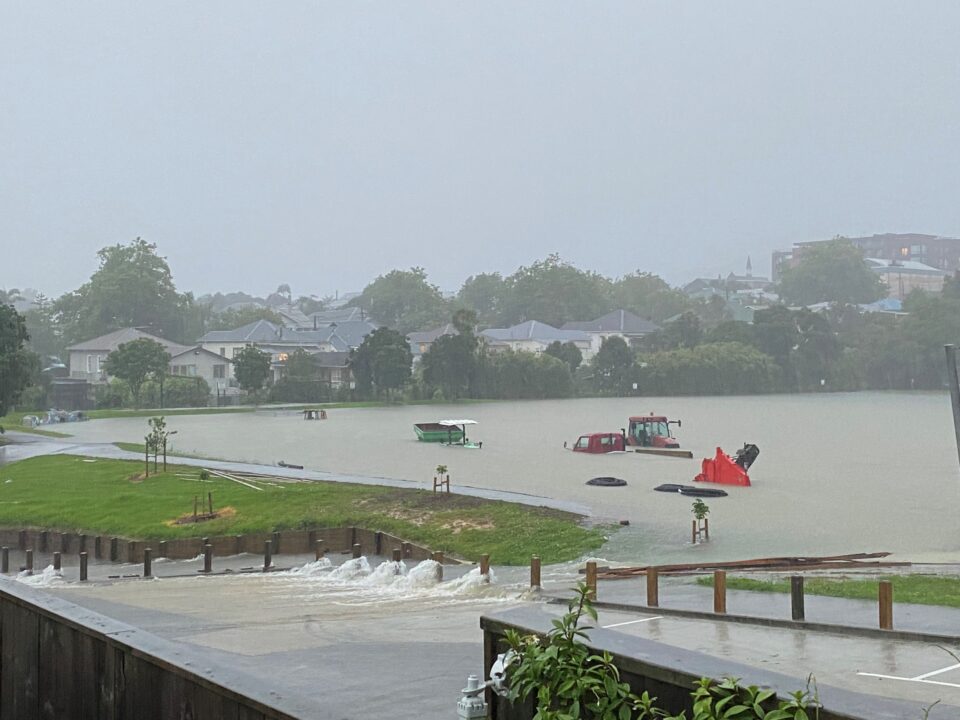 This article was written by Paul Buetow (partner) and Emma Poland (law graduate) in Dentons Kensington Swan’s Major Projects and Construction team.
This article was written by Paul Buetow (partner) and Emma Poland (law graduate) in Dentons Kensington Swan’s Major Projects and Construction team.
Contractors play a significant role in the clean up after the floods that hit the North Island in January and February of this year.
At the time of writing extreme weather and flooding had hit the country in the dark-grey form of Cyclone Gabrielle. Such events may become more common.
Contractors are accordingly asking what cost and or time relief are available to them under the 391X suite of contracts.
Equally, contractors faced with damage to their sites need to ensure that they comply with their obligations to secure the site and facilitate the making of insurance claims.
This article looks at some of the standard 3910 and 3916 terms on these issues. These terms are sometimes amended by special conditions, and so contractors are advised to always consult the specific terms of their contracts.
Time
Delays to completion of the Contract Works caused by the extreme weather we are seeing may qualify a contractor to extensions of time under 10.3.1. Relevant bases include:
- Weather sufficiently inclement to interfere with the progress of works (10.3.1(b));
- Loss or damage to the Contract Works or Materials (10.3.1(d));
- A flood event (10.3.1(e)); and
- Any circumstances not reasonably foreseeable by an experienced contractor at the time of tendering and not due to the fault of the Contractor (clause10.3.1(f)).
It is likely that a Contractor will be able to come within one of these grounds and be entitled to a time extension, such that the due date for completion is extended and there is relief for liquidated damages.
This is fair and appropriate as a Contractor should not be subject to liquidated damages for a natural event that it did not of course cause and could not control. Contractors should ensure that they give notice in writing of extension of time claims on one of the above grounds within 20 working days of the circumstances which give rise to an extension of time occurring (clause 10.3.2). Special conditions may make this a prerequisite of entitlement to an extension.
Costs
The above bases of time claim do not themselves give rise to an entitlement to costs or time-related costs, but the contractor may have costs claims on other more limited grounds.
Clauses 5.6.5 makes the contractor responsible for care of the works and site and the costs of repairing damage to it, however there are a number of ‘excepted risks’ in 5.6.6. These relevantly include ‘operation of the forces of nature as an experienced contractor could not reasonably foresee or make provision for’ (5.6.6(f)).
This should cover significant flooding and cyclones in most cases 8.1.6 adds the quirk that, if a risk like flooding is added to the insured risks in the special conditions, then that will not be an excepted risk, a repair will be at the contractors cost (with it then seeking to be made whole by the insurance policy).
Flooding or fallen trees may potentially affect the physical conditions on site in a manner justifying a Variation under 9.5 but this section is concerned with the effects of ‘weather away from the Site’, and so the trigger will likely have to be flood waters that have swept down through or across the site, rather than wind or rain acting on the site directly.
The weather may also necessitate instructions and further works beyond the original scope of the contract works. For example the contractor may be instructed to create further retaining walls as a result of slips, or to secure or prop newly exposed earth.
Where new instructions increase the scope of the Contract Works the contractor may seek a Variation under 9.1 and 9.2. The net effect of any Variation will also entitle the contractor to an extension of time (clause 10.3.1(a)).
As with ‘time extensions’ – the Contractor is entitled to a Variation, the notice provisions in NZS 3910 must be complied with and require notification of the claim within one month. While not drafted as a time bar by default, special conditions may change this.
First response and next steps
If the contractor has possession of a Site damaged by flooding or other event, then it is obliged by 5.6.5(a) to attend to potential environmental impacts (such as the escape of dangerous substances), and to otherwise secure and make the Site safe.
Contractors should take note of their obligations to give the principal advance notification / early warning of any matter which might impact the price or time for completion (5.21) which will very likely include the effects of the flooding and cyclone.
Such notification helps to avoid later argument that the contractor could have done more to mitigate the extent of the damage, and helps to maintain a collaborative approach to dealing with the disaster.
If insurance claims are available, then ultimately principals and contractors benefit from working together to shepherd these through. We recommend you try to keep lines of communication open and active, and keep good records and photos.
Do not hesitate to contact your legal advisors with questions.
This publication is not designed to provide legal or other advice and you should not take, or refrain from taking, action based on its content. Dentons Kensington Swan does not accept any liability other than to its clients, and then only in relation to specific requests for advice. For specific advice, contact your legal advisor or the Major Projects and Construction Team at Dentons Kensington Swan on (09) 379 4196.


Rising from the ashes